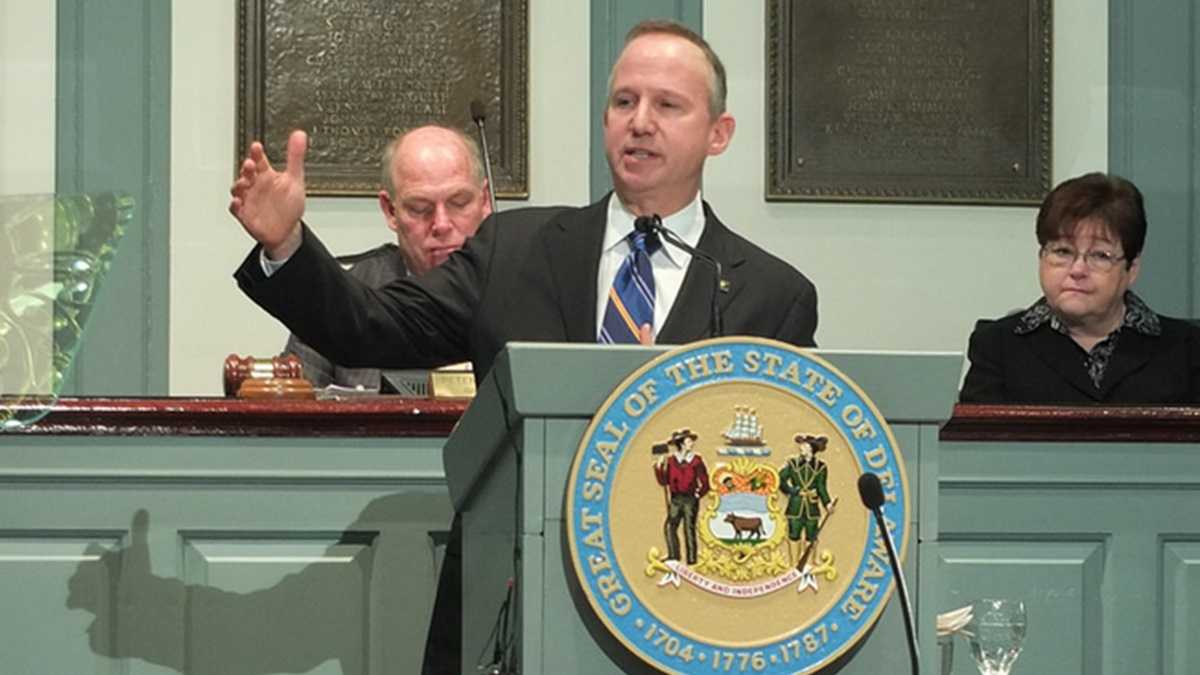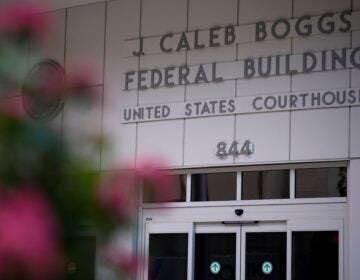With proposed gas tax and clean water fee, the clock is ticking for Gov. Markell

Delaware Gov. Jack Markell (NewsWorks file photo)
The final term of Governor Markell will present new challenges. Doug Rainey offers an essay on what is at stake.
Here is Doug’s Essaywork:
Delaware Gov. Jack Markell had an opportunity to coast during the last years of his final term.
While still tepid, the economy has improved, with unemployment falling to 6.1 percent in January from more than 7 percent a year earlier. But in many ways it does not feel like a recovery, thanks to a shrinking work force and the loss of blue-collar jobs in construction and manufacturing.
Evidence of this pain came in a recent News Journal report on the explosion of food stamp recipients that occurred since the recession took hold.
Explanations vary for the malaise, but could include an army of baby boomers heading to retirement (some have no other options) and Delaware-based jobs being filled by out-of-staters.
Left out of the growth curve are people with less education or outdated skills.
Markell’s options
Against this backdrop, the Democratic governor had a couple of options: One was trying to cut spending and taxes, with the hope that the cuts would jump-start the economy.
Another option was to do nothing and hope that the economy would improve enough to leave voters with a somewhat positive impression of his administration at the end of his term.
Markell did not accept either, and instead embarked on the bold move of pushing for both a gas tax increase and a long-term funding source, via a $45 fee tacked onto the property tax, in an effort to clean up the state’s waterways.
In choosing this course of action, Markell is taking a major risk in attempting to deal with two sacred cows: the gas and property taxes.
The victims of this decision could be Democratic legislators, who are feeling plenty of anger over taxes despite their clear majority in the General Assembly.
Changing revenues
In the past, national anger over taxes led to a Republican takeover. Currently, there are few indicators of such an occurrence, as the Delaware GOP is struggling with a lack of statewide office-holders and ongoing changes in party affiliations toward the Democrats.
What could be different this time around is the growing acknowledgement that Delaware has lost its ability to fund state operations through corporations based outside of its borders, an example of which is the sharp decline in casino revenues.
The loss of bill-paying ability could leave whichever party is in charge with the undesirable choice of either cutting spending (via layoffs and benefit cuts) or raising taxes.
This “let someone else pay” stance – aided by Interstate 95 tolls, corporate fees, growth in vehicle miles traveled and some budget sleight of hand – allowed Delaware to avoid imposing a gas tax increase since the 1990s.
As budgets tightened, transportation salaries were moved to the Transportation Trust Fund while gas prices rose and consumption dropped.
Water quality has improved from the dark days of the 1960s, but as a matter of policy, water quality is a long-neglected topic.
After the initial success of federal legislation that poured money into waste treatment plants and industrial pollution clean-up efforts, bold steps have not been a priority, even during periods when the state seemed to be swimming in tax revenue.
Speaking of swimming, few waterways are safe enough for a dip and eating fish from many streams is strongly discouraged.
In an effort to fund more water clean-up projects, Markell is proposing a fee added to property taxes that ranges from about a dollar a week for households to a yearly maximum of $25,000 for the largest businesses.
The upside is that the twin tax hikes could add a modest boost to the economy in the form of construction and engineering jobs. The downside is the widely held view that the state is simply too weak to add to anyone’s tax burden.
What both sides are – or aren’t – saying
To date, reactions have been predictable.
The environmentalist fringe deeply distrusts a centrist governor who supported a new poultry processing plant in Sussex County, the reopening of the Delaware City Refinery and a proposal for a data center with an attached power plant in Newark.
Others put forth the argument that the gas tax falls hardest on those with the least income.
With regard to water quality, the tax is expected to add to upstate-downstate tensions. Residents to the south are likely to worry that their funds will clean up pollution in New Castle County. In northern Delaware, there are suspicions that the bills are coming as a result of what some view as a “growth at any cost” strategy.
Republicans in the General Assembly are quick to attack any new taxes, pointing to what they see as a culture of ineptitude and corruption. They are also pointing to a proposal they previously championed to use funds from a prior budget surplus for clean-up efforts.
In the middle are Democratic legislators who are largely quiet. Few, if any, champions for the gas tax have emerged from the ranks of Democrats at Legislative Hall. The majority party is also strangely silent on the water quality legislation, although Markell was able to summon up some kind words for the measure in the press release accompanying the water initiative.
Also of note is the fact that the Markell administration has been touched by a “pay to play” scandal of political contributions and insider deals that led to a major housecleaning at the Delaware Department of Transportation. In proposing the gas tax increase, Markell claimed that the problems with DelDOT are now in the rearview mirror.
Individual Republican legislators have come up with alternatives to the gas tax that would trim the total state budget, put that money into transportation funding and avoid the current transfer of transportation funds to balance the budget.
Republicans say that these actions would fix the transportation funding crisis. Others are not so sure, pointing to federal gas mileage standards that will take hold in coming years and will reduce fuel consumption.
To date, Republicans have been largely silent on options to the water clean-up proposal.
The clock is ticking
The lingering question is whether Markell would even propose the tax increases during an election year.
Perhaps, after looking at the possibilities, Markell is at the point in his term where he sees the pain of proposing tax increases as preferable to sitting back and watching the economy stage a painfully slow economy.
He knows that his party will be slow to warm to any proposal that takes money out of their constituents’ pockets, but his move buys time for an education effort and could pay off when the General Assembly, not facing election pressures, returns in 2015.
Indeed, a number of legislative insiders believe the big push on transportation and water quality funding will come in 2015.
To date, the negative comments on social media and in letters to the editor rarely get a response from the other side, even from those who once supported the proposals.
That will have to change.
The governor has time to make his case, but the clock is ticking.
Doug Rainey is the editor of the Delaware Business Daily. Email Doug, drainey@delawarebusinessdaily.com or follow him on twitter: @DougRaineyDE.
WHYY is your source for fact-based, in-depth journalism and information. As a nonprofit organization, we rely on financial support from readers like you. Please give today.




